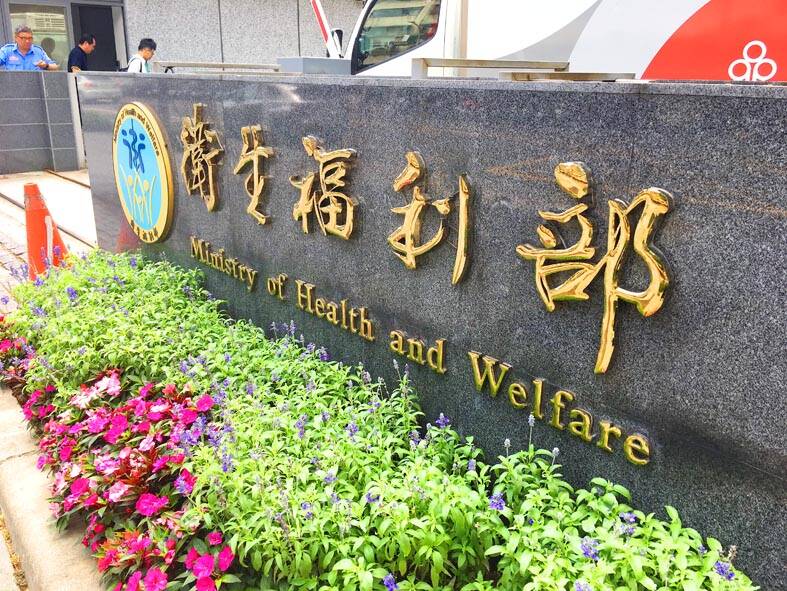The Executive Yuan yesterday approved two bills to govern regenerative medicine that aim to boost development of the field.
Taiwan would reach an important milestone in regenerative medicine development with passage of the regenerative medicine act and the regenerative medicine preparations ordinance, which would allow studies to proceed and treatments to be developed, Deputy Minister of Health and Welfare Victor Wang (王必勝) told reporters at a news conference after a Cabinet meeting.
Regenerative treatments have been used for several conditions, including cancer — by regenerating blood cells — and restoring joint function in soft tissue, Wang said.

Photo: Taipei Times
The draft legislation requires regenerative treatments to undergo human trials, he said.
“However, human trials might be waived if patients’ lives are in danger or in other extenuating circumstances,” he added.
Ministry of Health and Welfare Department of Civil Ethics Director-General Liu Yueh-ping (劉越萍) said that waivers for human trials would only be granted when people seek new treatments after other methods have failed.
The draft regenerative medicine bill stipulates that only government-certified medical institutions can administer such treatments, with individuals or organizations that administer them without permission to face fines of NT$2 million to NT$20 million (US$61,391 to US$613,911).
Non-medical institutions would face fines of NT$2 million to NT$20 million for advertising for the use of regenerative medical treatments, the bill says.
The bill also lists the conditions under which medical institutions could proceed with regenerative medical treatments without first conducting human trials.
People must have a life-threatening or severely debilitating disease, and Taiwan cannot have medication, equipment or technology that meets the need, while medical institutions can offer regenerative medical treatments that have been approved by the ministry before the bill is promulgated, it says.
The bill would also upgrade the status of the Ethical Guidelines Governing the Research of Human Embryos and Embryonic Stem Cell Research to law. The guidelines state that embryos and embryonic stem cells used in regenerative medical studies must not be produced through artificial insemination.
Moreover, embryos or embryonic stem cells acquired for research cannot be used to implant nucleated human ova in cell nuclei of other species, the guidelines say.
Researchers would be banned from acquiring research-use embryos for embryonic stem cells or using them to produce chimeric species that have human germ cells, the guidelines say.
The regenerative medicine preparations ordinance covers treatments that contain genes, cells and their derivatives for human use, including gene therapy, cell therapy and tissue engineering.
Pharmaceutical firms seeking to manufacture or import regenerative treatments must have their facilities inspected and registered, and they must be approved and issued a valid license to manufacture or import the products, the bill says.
Licenses would be valid for five years and can be extended for another five years if an extension is applied for three to six months in advanced and it is approved, the bill says.
To facilitate “compassionate treatment” for people with life-threatening illnesses for which other treatments are not available, the bill authorizes the ministry to approve under certain conditions the use of regenerative products after a phase 2 clinical trial has been completed and the product has been shown to be safe and effective.
Licenses for such products would be valid for five years and cannot be extended.
Both bills have regulations to protect people seeking regenerative treatment or medication.
The ministry has the authority to stop or terminate all or part of a regenerative treatments if a medical provider is facing an unusually high number of liability cases.

An essay competition jointly organized by a local writing society and a publisher affiliated with the Chinese Communist Party (CCP) might have contravened the Act Governing Relations Between the People of the Taiwan Area and the Mainland Area (臺灣地區與大陸地區人民關係條例), the Mainland Affairs Council (MAC) said on Thursday. “In this case, the partner organization is clearly an agency under the CCP’s Fujian Provincial Committee,” MAC Deputy Minister and spokesperson Liang Wen-chieh (梁文傑) said at a news briefing in Taipei. “It also involves bringing Taiwanese students to China with all-expenses-paid arrangements to attend award ceremonies and camps,” Liang said. Those two “characteristics” are typically sufficient

A magnitude 5.9 earthquake that struck about 33km off the coast of Hualien City was the "main shock" in a series of quakes in the area, with aftershocks expected over the next three days, the Central Weather Administration (CWA) said yesterday. Prior to the magnitude 5.9 quake shaking most of Taiwan at 6:53pm yesterday, six other earthquakes stronger than a magnitude of 4, starting with a magnitude 5.5 quake at 6:09pm, occurred in the area. CWA Seismological Center Director Wu Chien-fu (吳健富) confirmed that the quakes were all part of the same series and that the magnitude 5.5 temblor was

The brilliant blue waters, thick foliage and bucolic atmosphere on this seemingly idyllic archipelago deep in the Pacific Ocean belie the key role it now plays in a titanic geopolitical struggle. Palau is again on the front line as China, and the US and its allies prepare their forces in an intensifying contest for control over the Asia-Pacific region. The democratic nation of just 17,000 people hosts US-controlled airstrips and soon-to-be-completed radar installations that the US military describes as “critical” to monitoring vast swathes of water and airspace. It is also a key piece of the second island chain, a string of

The Central Weather Administration has issued a heat alert for southeastern Taiwan, warning of temperatures as high as 36°C today, while alerting some coastal areas of strong winds later in the day. Kaohsiung’s Neimen District (內門) and Pingtung County’s Neipu Township (內埔) are under an orange heat alert, which warns of temperatures as high as 36°C for three consecutive days, the CWA said, citing southwest winds. The heat would also extend to Tainan’s Nansi (楠西) and Yujing (玉井) districts, as well as Pingtung’s Gaoshu (高樹), Yanpu (鹽埔) and Majia (瑪家) townships, it said, forecasting highs of up to 36°C in those areas